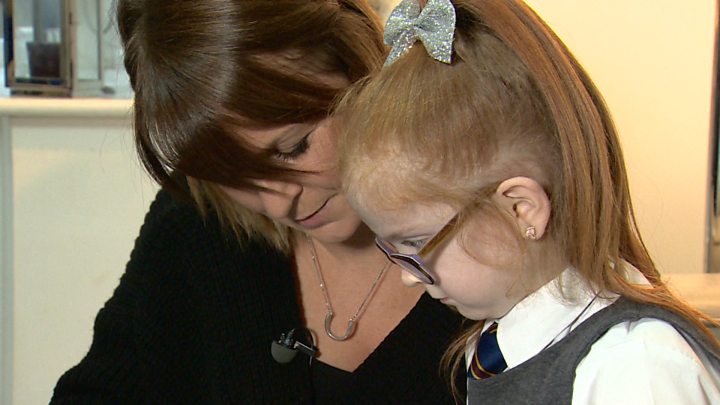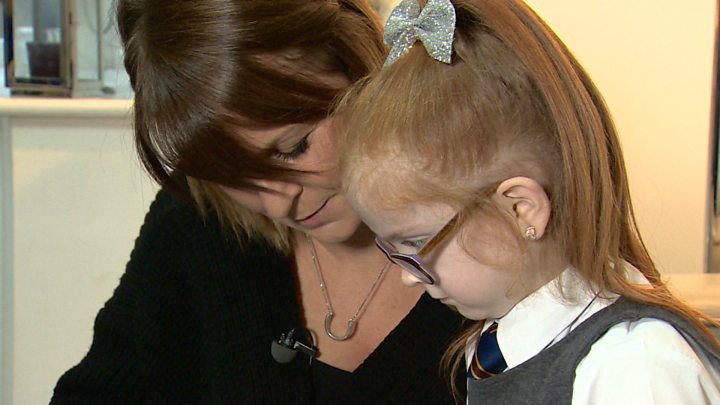Cambuslang mum suing NHS after attempted murder accusation
Kirsteen Cooper was arrested and put in a jail cell after a hospital wrongly accused her of trying to harm her…


Media playback is unsupported on your device
A mother who was wrongly accused of trying to kill her disabled daughter by medical staff is to sue the hospital where the claims were made.
Kirsteen Cooper was accused of causing infections and cutting a feeding tube attached to her daughter Baillie.
This led to police charging her with attempted murder and access to her daughter being restricted for two years.
After accusations were disproved by medics, the charges were dropped.
Now Mrs Cooper, 42, is preparing a legal case against NHS Greater Glasgow and Clyde.
‘The worst thing you could imagine’
She claims she “wanted to die” after being wrongly accused. She was arrested and placed in a cell overnight after staff at the Royal Hospital for Children (RHC) in Glasgow wrongly accused her of stealing blood from her daughter Baillie “to make her anaemic”.
Speaking of the moment police arrested and charged her on 20 July 2017, Mrs Cooper told BBC News: “My first reaction was that I didn’t want to be here any more.
“Baillie and my children are my absolute world, my complete life. So to be accused of anything, let along the worst thing you could imagine in the world, and the most special person to you in the world, you just feel like your life is not worth living if that’s what someone can accuse you of.”
The hospital accused Mrs Cooper of having suspected fabricated induced illness (FII), formerly known as Munchausen’s syndrome by proxy.
According to the NHS website, FII is a rare form of child abuse where a parent or carer exaggerates or deliberately causes symptoms of illness in the child.
Mrs Cooper said that in January 2017, she and her husband Craig were worried that Baillie, who has cerebral palsy, was continually catching infections in hospital. They had concerns about the hospital which they believed were a factor in their daughter being unwell.
They made a formal complaint to the hospital.
She said: “In February, Baillie’s feeding tube leaked in hospital and they accused me of deliberately cutting her tube so she couldn’t be fed.
“That night, social work appeared at Baillie’s room and removed us from the hospital saying we were not allowed to be with her any more. And that went on for two years.”
Baillie was discharged from hospital in May 2017 and was to stay at her aunt and grandmother’s home. She was not allowed to return to the family home where her two older sisters remained and her parents were only allowed supervised contact.
In July Ms Cooper was questioned by police.
She said: “I was arrested and charged with the attempted murder of Baillie. I was put in a cell overnight then taken to court.”
Several months later, criminal charges were dropped and no further action taken.
During the course of the investigation, Mrs Cooper was only allowed to see her daughter in supervised visits of two hours at a time, which was increased over several months to 10 hours.
It is the missed time with her young daughter that she says has made her go ahead with the civil case.
Lawyers for the Cooper family are expected to serve a writ on NHS Greater Glasgow and Clyde this week, reported the Daily Record on Monday.
Mrs Cooper said: “What we have all been put through as a family is unbelievable.
“The reason I want to pursue it is because the time and the memories we lost with Baillie we can never get back. Special times like starting school that we were not allowed to be on our own with her.
“We want to ensure this never happens to another innocent family. We want things to be put in place that before children can be removed from their parents, there must be some kind of solid evidence of why it is happening so children don’t have to go through this trauma.
“We watched Baillie go through trauma every night in hospital for months – hysterical crying being taken away from us.”
Baillie was admitted to RCH in December 2016.
RCH is part of the £842m Queen Elizabeth University Hospital (QEUH) campus in Glasgow, which is the focus of a public inquiry over safety fears and patient deaths from infections. The hospital is currently under “special measures” from the Scottish government which allow for greater supervision of its operation and performance.
An NHSGG spokeswoman said: “We are unaware of any legal proceedings. The board does not comment on individual legal cases.”
The family is now rebuilding their lives.
Mrs Cooper fears she will never fully recover from the ordeal and says she is still trying to come to terms with what happened.
She said: “We just feel like information wasn’t gathered properly, the relevant people weren’t spoken to when they should have been spoken to at the time, and it has all gone a lot further than anybody would have anticipated.”

